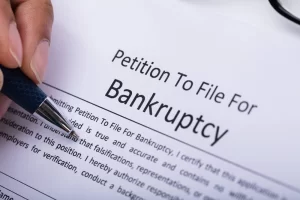Dealing with a divorce is already a stressful situation, and if you add bankruptcy to the mix, things get even harder.
Divorce and bankruptcy are often causally related. The common denominator between the two is a fresh start. Both procedures allow the petitioner to clear mistakes or unfortunate events that broke the marriage. Often, money problems lead to divorce, and when one or both spouses contemplate divorce, they may consider bankruptcy to discharge debts they cannot possibly pay or can only pay with the court’s protection. But the critical question when planning a bankruptcy is when to file. Sometimes you have no choice but to file right away, but when you can time your bankruptcy and divorce, some considerations may sway your opinion about when to file your bankruptcy and divorce in New Jersey.
Filing for Bankruptcy and Divorce at the Same Time in NJ
First, understand that a debtor files bankruptcy in federal court and divorce in state. As soon as you file a bankruptcy, the bankruptcy court stays or freezes any other litigation you are involved in, including a divorce. Once a petition is filed, you have a bankruptcy estate, which includes all assets and debts when filing the bankruptcy. Since divorce involves the division of assets and debts, including those of the one or both filing bankruptcy, you can see how the divorce proceeding would be placed on hold until the bankruptcy gets underway and a party files a motion to remove the stay regarding the divorce. As such, filing for bankruptcy before or after the divorce makes sense to avoid prolonging the litigation.
Benefits of First Filing for Divorce and then for Bankruptcy
The advantage of filing before the divorce, especially if both parties are filing for bankruptcy, is it is easier to divide assets and debts. In divorce, the parties seek an equitable division of the couple’s assets and debts. But if the debts no longer exist due to bankruptcy, the divorce may be more straightforward on the property side of the equation. However, there may be debt payments for non-dischargeable debts in bankruptcy to make, which means that debt may be the subject of agreement or contention in the divorce. Also, if only one party filed bankruptcy, the issue may be more complicated. That means one party got rid of all their debt, so the spouse who does not file bankruptcy may be left paying off the joint debt. In addition, if one party seeks liquidation, meaning selling off assets to pay debts, they may not qualify if the other spouse’s income counts toward a bankrupt’s total income. In other words, they may not be eligible for bankruptcy because they have too much income.
What Happens to the Marital Debt with Bankruptcy and Divorce?
Even if one party does qualify for bankruptcy, they cannot simply leave the other party with all the marital debt in an equitable split of the obligations and assets in the divorce. If one party is responsible for the marriage debt post-bankruptcy, a judge could consider that fact in calculations for child support and alimony. Thus, if the spouse who earns more than the other pays all or most of the marital debt, a judge may consider the debt in calculating a lower support payment. In the converse perspective, a spouse who earns less but bankrupts their debt may have a reduced support payment because they have less need for support, and the converse is true. The payor spouse with no debt may pay more. Moreover, a court can consider what is equitable in allotting the marital debt between the spouses so that one spouse does not have to pay all the marital debts after the other gets a discharge in bankruptcy. And you cannot bankrupt and dispose of child support or spousal support, so waiting until the divorce is over will not affect those payments.
Another consideration is that a divorce judgment that includes an equitable property division may not be discharged in bankruptcy either. So, when a judge divides a business and orders the business owner to pay their spouse a fair amount in exchange for keeping the business, that equitable payment may not go away in bankruptcy following divorce. A bankruptcy court judge should consider equitable distribution payments non-dischargeable debt. However, if they don’t, the slighted party can come back to family court to get the judge to reapportion the property division so that it is equitable or order increased alimony until the creditor spouse recoups the amount of the property division. In other words, courts do not take kindly to those who file bankruptcy after the divorce to get out of terms of the divorce decree.
Filing for Bankruptcy Together is not a Bad Idea in NJ Courts

Of course, when both parties accumulate substantial debt during the marriage, they may want to file bankruptcy together to save time and money rather than two separate bankruptcies before or after the divorce. However, if each party acquired valuable assets before or during the marriage, each may want to file separately to protect their assets. If only one party files for bankruptcy before marriage, their bad credit may affect the couple’s finances, such as higher interest rates on joint purchases for homes and cars. In a subsequent divorce proceeding, the entire financial picture is in view, including who contributed more to the debt, especially if one spouse was financially responsible and the other was not. Depending on the length of the marriage and the parties’ actions, a judge could allot more debt to the one responsible for it.
The Guidance of a Knowledgeable Lawyer Becomes Paramount When Simultaneously Facing Divorce and Bankruptcy in NJ
Both bankruptcy and divorce are complicated in New Jersey, but it is even trickier when you combine the two. Not all assets are treated alike in bankruptcy court, and the right bankruptcy for each filer requires a detailed look at the entire financial picture. In addition, you and your spouse may have a different economic outlook, and so you may be better off filing bankruptcy after the divorce. Only an experienced attorney in each area can help you make determinations of timing and preparation for both divorce and bankruptcy.
Consulting with an experienced lawyer who frequently confronts bankruptcy concerns in divorce and family law cases is a worthwhile investment of time and money. In fact, getting the correct advice can save you more money and peace in the long run when you know what is suitable for the future of your finances and the relationship with your ex-spouse.
If you are facing how to manage Bankruptcy and Divorce in Hudson County, Bergen County, Essex County, Passaic County, or elsewhere in New Jersey, contact our Team of NJ Family Lawyers for help weighing your options
At The Montanari Law Group, we assist clients with divorce, equitable distribution, and financial concerns throughout Ringwood, Paterson, Jersey City, Hackensack, West Milford, Wanaque, Passaic, and neighboring towns across Northern New Jersey. To speak with one of our family lawyers regarding your divorce and bankruptcy case, contact us online or call (973) 233-4396 for a free confidential consultation.

